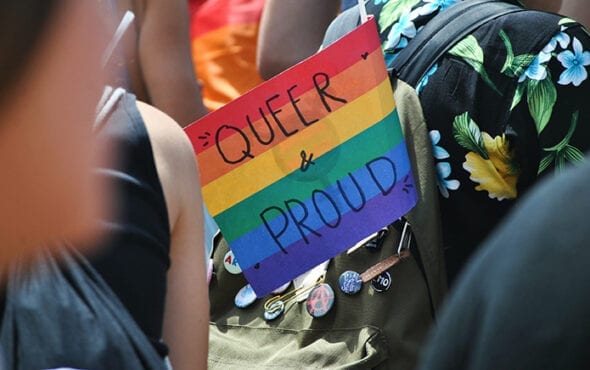
A children’s books editor from Hungary who has received death threats and homophobic abuse over his work said on Monday he would leave the country following the introduction of a law banning LGBTQ+ content in schools.
The law that came into force last week, which has been condemned by the European Union, bans material that “promotes or depicts gender change and homosexuality” to under-18s.
Critics say the legislation could fuel discrimination against LGBTQ+ Hungarians.
“I fear a little bit and that is why (myself and my partner) plan to leave the country,” book editor Boldizsar Nagy M, who is gay, told the Thomson Reuters Foundation.
“This is my life, but because things are getting very insecure here, I feel I should do this from another country,” he said by phone.
Nagy, 38, said he had received death threats following the publication of two books he had edited, “Wonderland Is For Everyone” by numerous authors, and another containing two titles by US science fiction and fantasy writer Lawrence Schimel.
“There was one man who said, ‘You are not a man, you are just a f****t and you should die,'” Nagy said.
Last week, a Hungarian local authority fined bookshop chain Lira Konyv 250,000 forints ($835.95) for selling the Schimel book, which features same-sex parents and their children, under a law that bans unfair trade practices.
A local government official said the distributor had misled customers because the book had been placed in shops among other children’s books without adequate signposting about its “different” content.
Nagy was involved in a similar controversy last year following the publication of “Wonderland Is For Everyone”, a children’s book that he said he hoped would help youngsters to learn to accept minorities and fight social ostracism.
Instead, it caused a stir in Hungarian politics, with far-right supporters and the ruling nationalist government labelling it “homosexual propaganda” that should be banned from schools.
Both books were designed to increase the representation of LGBTQ+ characters in children’s literature, said Nagy, who now fears the Hungarian publishing industry will not dare to publish any books aimed at minors that include LGBTQ+ topics.
“It will kill literature here for a while,” Nagy said. “There is a big insecurity and fear (about what will happen next) and we are very angry.”
Literature has been his life, said Nagy, who also works as a journalist and translator. “As a child I was the first in my kindergarten to read. (Now,) I talk about books, I edit them and I translate them.
“I will continue this work. But I don’t feel good in this country anymore,” he added.
Reporting by Hugo Greenhalgh
GAY TIMES and Openly/Thomson Reuters Foundation are working together to deliver leading LGBTQ+ news to a global audience


